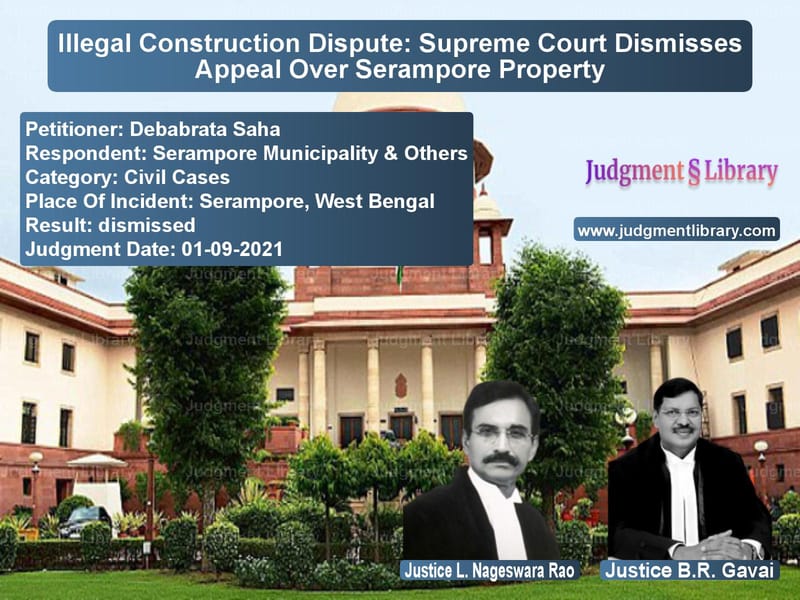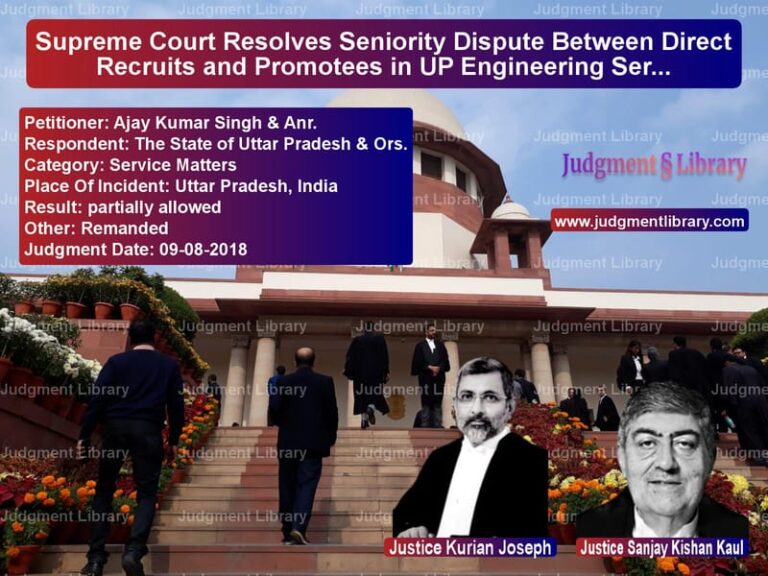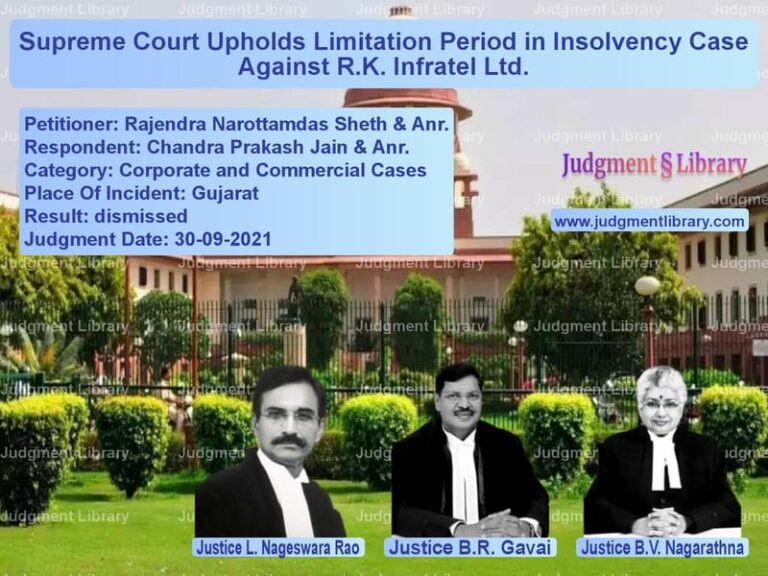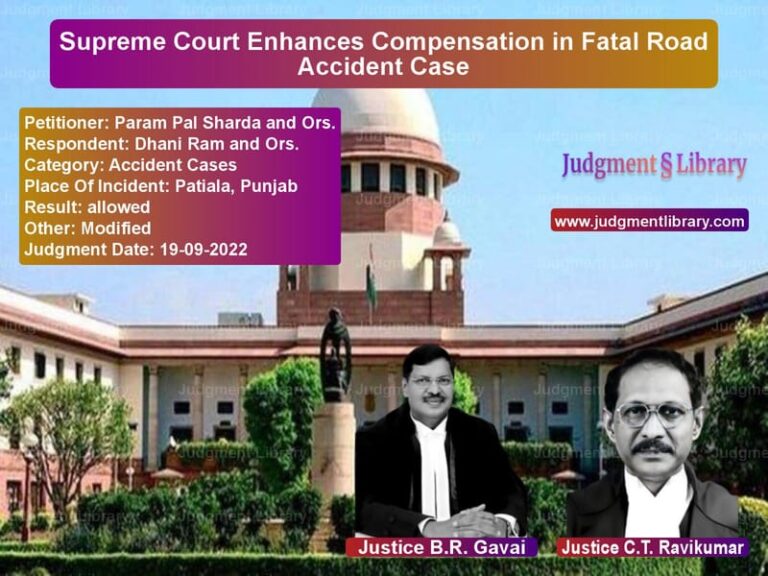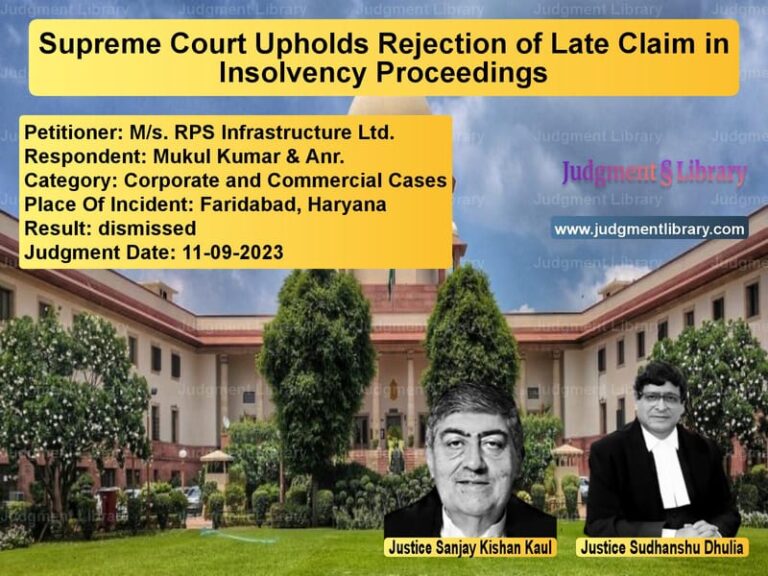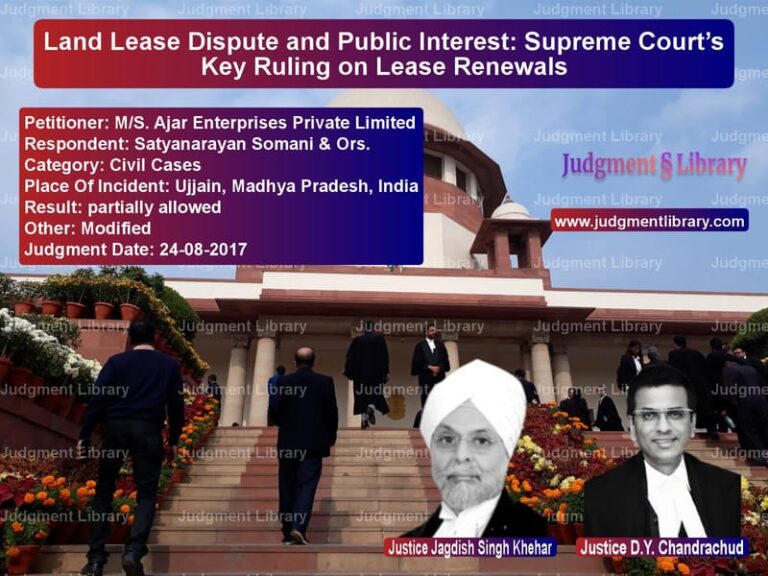Illegal Construction Dispute: Supreme Court Dismisses Appeal Over Serampore Property
The Supreme Court of India recently ruled on a property dispute in the case of Debabrata Saha vs. Serampore Municipality & Others. The case involved a long-standing disagreement over an allegedly unauthorized construction on the second floor of a two-storied building in Serampore, West Bengal. The Court dismissed the appeal, reaffirming that the dispute regarding construction rights should be settled through a civil court rather than by municipal authorities.
Background of the Case
The dispute began when the appellant, Debabrata Saha, purchased the ground floor of a two-storied building located at 45/2/G.T. Road (West), Serampore, from Respondent No.3 through a registered deed of conveyance dated August 14, 2002. Following the purchase, mutation was carried out in the appellant’s name on March 12, 2003.
However, on December 31, 2003, the appellant alleged that Respondent No.3, who lived on the first floor, had begun construction on the roof of the second floor. The appellant immediately lodged complaints with the local police station and the Serampore Municipality. As no action was taken, he filed a writ petition before the Calcutta High Court, alleging municipal inaction.
High Court Proceedings
The Calcutta High Court initially directed the Board of Councilors of Serampore Municipality to review the appellant’s complaints. On February 14, 2006, the municipal authorities ruled that Respondent No.3 had obtained building permissions through misrepresentation, and the sanctioned plan was revoked.
The appellant, dissatisfied with the lack of further action, filed another writ petition, requesting the demolition of the allegedly illegal structure. The High Court directed the municipality to initiate proceedings under Section 218 of the West Bengal Municipal Act, 1996, which governs the demolition of unauthorized buildings.
Respondent No.3 then challenged the revocation of the building plan, and a Single Judge of the Calcutta High Court dismissed the writ petition, advising the respondent to seek remedy through an appeal. The respondent subsequently filed an appeal before the Division Bench of the Calcutta High Court, which ruled in his favor, dismissing the appellant’s writ application. This prompted the appellant to approach the Supreme Court.
Arguments by the Petitioner (Debabrata Saha)
- The appellant contended that Respondent No.3 had obtained the building permit through misrepresentation and suppression of facts.
- He argued that the Serampore Municipality had revoked the plan after verifying the irregularities.
- He claimed that the construction was illegal and that the municipal authorities had the power to demolish the unauthorized structure.
Arguments by the Respondents (Serampore Municipality & Others)
- The respondents argued that the revocation of the building permit was procedurally invalid because the Chairman of the Municipality made the decision, rather than the full Board of Councilors.
- They contended that the dispute was fundamentally a private civil matter between the two property owners.
- They maintained that any challenge to construction rights should be settled through a civil court rather than through municipal proceedings.
Supreme Court’s Key Observations
- The Supreme Court ruled that the Chairman alone did not have the authority to revoke the building plan under Section 217 of the West Bengal Municipal Act, 1996.
- The revocation of the plan was declared a nullity as it was not issued by the full Board of Councilors.
- The Court found that the dispute centered on property rights, making it a matter for a civil court rather than municipal authorities.
- The Court upheld the Calcutta High Court’s ruling that the appellant must seek relief in a civil court rather than relying on municipal intervention.
Final Verdict
- The Supreme Court dismissed the appeal.
- The ruling of the Division Bench of the Calcutta High Court was upheld.
- The Court held that any dispute regarding construction rights must be adjudicated in a civil court.
Implications of the Judgment
This ruling has important implications for property disputes and municipal governance:
- Proper Authority in Municipal Decisions: The judgment reinforces that municipal actions, such as revoking a building permit, must be taken by the appropriate statutory authority.
- Civil Courts as the Appropriate Forum: The case establishes that disputes over property rights and construction should be handled by civil courts, not by municipal bodies.
- Misrepresentation in Building Permits: The case highlights the legal consequences of obtaining construction approvals through false representations.
- Role of Municipalities in Property Disputes: Municipal bodies must act within their legal authority and cannot interfere in private property disputes unless authorized by law.
Conclusion
The Supreme Court’s ruling in Debabrata Saha vs. Serampore Municipality & Others underscores the necessity of following statutory procedures in municipal governance. The decision clarifies that property disputes involving unauthorized construction should be addressed through civil litigation rather than through municipal intervention. The ruling reinforces the principle that legal remedies should be sought in the appropriate forum, ensuring that municipal bodies do not overstep their jurisdiction.
Petitioner Name: Debabrata Saha.Respondent Name: Serampore Municipality & Others.Judgment By: Justice L. Nageswara Rao, Justice B.R. Gavai.Place Of Incident: Serampore, West Bengal.Judgment Date: 01-09-2021.
Don’t miss out on the full details! Download the complete judgment in PDF format below and gain valuable insights instantly!
Download Judgment: debabrata-saha-vs-serampore-municipali-supreme-court-of-india-judgment-dated-01-09-2021.pdf
Directly Download Judgment: Directly download this Judgment
See all petitions in Property Disputes
See all petitions in Landlord-Tenant Disputes
See all petitions in Judgment by L. Nageswara Rao
See all petitions in Judgment by B R Gavai
See all petitions in dismissed
See all petitions in supreme court of India judgments September 2021
See all petitions in 2021 judgments
See all posts in Civil Cases Category
See all allowed petitions in Civil Cases Category
See all Dismissed petitions in Civil Cases Category
See all partially allowed petitions in Civil Cases Category

